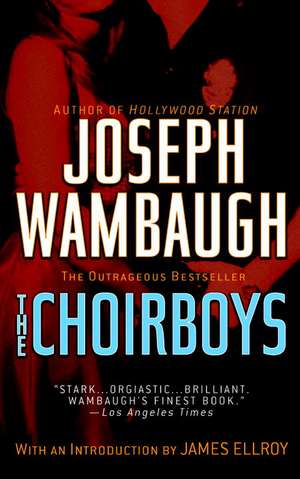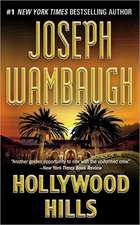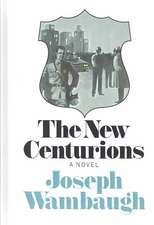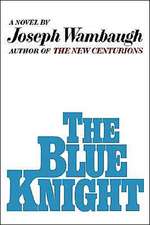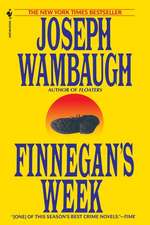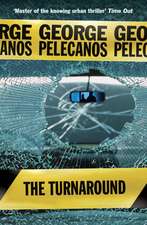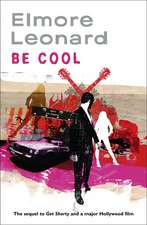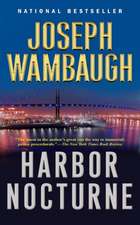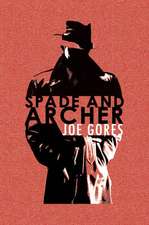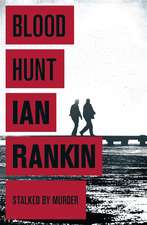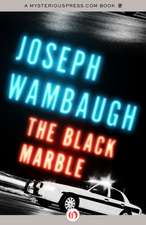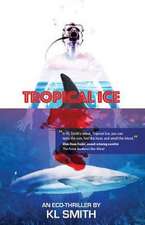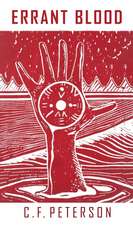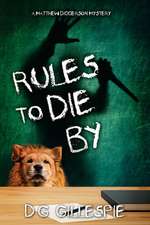The Choirboys
Autor Joseph Wambaugh James Ellroyen Limba Engleză Paperback – 31 iul 2007
| Toate formatele și edițiile | Preț | Express |
|---|---|---|
| Paperback (2) | 48.91 lei 3-5 săpt. | +25.06 lei 7-13 zile |
| Orion Publishing Group – 5 iul 2007 | 48.91 lei 3-5 săpt. | +25.06 lei 7-13 zile |
| DELTA – 31 iul 2007 | 115.73 lei 3-5 săpt. |
Preț: 115.73 lei
Nou
Puncte Express: 174
Preț estimativ în valută:
22.14€ • 23.20$ • 18.31£
22.14€ • 23.20$ • 18.31£
Carte disponibilă
Livrare economică 22 martie-05 aprilie
Preluare comenzi: 021 569.72.76
Specificații
ISBN-13: 9780385341608
ISBN-10: 0385341601
Pagini: 399
Dimensiuni: 132 x 208 x 23 mm
Greutate: 0.43 kg
Editura: DELTA
ISBN-10: 0385341601
Pagini: 399
Dimensiuni: 132 x 208 x 23 mm
Greutate: 0.43 kg
Editura: DELTA
Notă biografică
Joseph Wambaughis the hard-hitting bestselling writer who conveys the passionate immediacy of a special world. He was a police officer with the LAPD for 14 years before retiring in 1974, during which time he published three bestselling novels. Over the course of his career, Wambaugh has been the author of more than 20 works of fiction and nonfiction, all written in his gritty, distinctive noir-ish style. He's won multiple Edgar Awards, and several of his books have been made into feature films and TV movies. He lives in California with his wife.
Extras
Chapter One
Territorial Imperative
The man most deserving of credit for keeping the MacArthur Park killing out of the newspapers before it brought discredit to the Los Angeles Police Department was Commander Hector Moss. It was perhaps Commander Moss' finest hour.
The blond commander was so exultant this afternoon he didn't mind that Deputy Chief Adrian Lynch was keeping him waiting the allotted time. Chief Lynch kept all callers waiting precisely three minutes before coming to the phone, unless his secretary told him it was an assistant chief or the chief of police himself or one of the commissioners or a city councilman or anyone at City Hall who reported directly to the mayor.
Moss despised Lynch for having a do-nothing job and a specially ordered oversized desk. Moss knew for a fact that Deputy Chief Lynch had secret plans to increase his personal staff by two: one policewoman and one civilian, both of whom were busty young women. Commander Moss knew this because his adjutant, Lieutenant Dewey Treadwell, had sneaked into Lynch's office and searched his file basket when a janitor left the door open. Of course Lieutenant Treadwell could not receive a specifically worded commendation for his assignment but he did receive an ambiguously worded "attaboy" from Moss.
But there was another assignment which Treadwell had failed to carry out, and Commander Moss' stomach soured as he remembered it. It had to do with Moss' IQ score of 107. Throughout his twenty-one year career his IQ had meant nothing to his rise to the rank of commander. Indeed, he had not even known what his score was. He had been a state college honors student in police science and reasoned that no one with an ordinary IQ could manage this. But with the retirement of a senior deputy chief it had been called to Moss' attention by none other than Deputy Chief Lynch who didn't think the promotion board would consider a man for such a high police post who possessed an IQ of only 107. Lynch's own IQ was 140.
Commander Moss was livid. He took Lieutenant Treadwell to a Chinatown bar one Friday after work and forced the teetotaler to down five cocktails, promising his personal patronage for the rest of Treadwell's career if he could carry off a most delicate assignment. The ever ambitious, thirty year old lieutenant agreed to slip into Personnel Division that night and change Commander Moss' IQ score from 107 to 141.
Commander Moss downed his fourth Singapore sling and said, "Treadwell, I know I can depend on you."
But instantly the lieutenant's ambition gave way to fear. He stammered, "If anything ever . . . well, look, sir, the watch commander of Personnel is a former detective. He might start sniffing around. They have ways in the crime lab to tell if documents have been tampered with!"
"Don't talk crime lab to me, Treadwell," Moss replied. "Have you ever worked the Detective Bureau?"
"No, sir."
"You listen to me, Treadwell. You're an office pogue. You never been anything but an office pogue. You don't have the slightest idea what goes on in a working police division. But you keep your mouth shut and do what you're told and I'll see to it that you're a captain someday and you can have your own station to play with. You don't and I'll have you in uniform on the nightwatch in Watts. Understand me, Treadwell?"
"Oh, yes, sir!"
"Now drink your Pink Lady," Commander Moss commanded. (It was Hector Moss who had persuaded the chief of police that the traditional police rank of "inspector" was no longer viable in an era of violence when policemen are called upon to employ counterinsurgency tactics. Thanks to Moss all officers formerly of the inspector rank could now call themselves "commander." Moss had "Commander and Mrs. Hector Moss" painted on his home mailbox. Commander Moss had been a PFC in the army.)
Lieutenant Treadwell tried desperately every night for three weeks to sneak into Personnel Division. Each morning he reported a "Sorry, sir, negative" to Commander Moss. Lieutenant Dewey Treadwell lost ten pounds in those three weeks. He slept no more than four hours a night and then only fitfully. He was impotent. On the twenty-first night of his mission he was almost caught by a janitor. Lieutenant Treadwell was defeated and admitted it to Commander Moss on a black Wednesday morning.
The commander listened to his adjutant's excuses for a moment and said, "Did you get a good look at the janitor's face, Lieutenant?"
"Yes, sir. No . . . I don't know, sir. Why?"
"Because that boogie might live in Watts. And you'll need some friends there. because that's where i'm sending you on the next transfer, you incompetent fucking pansy!"
Commander Moss did not send Lieutenant Treadwell to Watts. He decided a spineless jellyfish was preferable to a smart aleck like Lieutenant Wirtz who worked for Deputy Chief Lynch. What he did was to go into Personnel Division in broad daylight, rip the commendation he wrote for Treadwell out of the file, draw a black X through it with a felt tipped pen, seal it in an envelope and leave it in Lieutenant Treadwell's incoming basket without comment.
Lieutenant Treadwell, after his hair started falling out in tufts, earned his way back into Commander Moss' good graces by authoring that portion of the Los Angeles Police Department manual which reads:
sideburns: Sideburns shall not extend below the bottom of the outer ear opening (the top of the earlobe) and shall end in a clean-shaven horizontal line. The flare (terminal portion of the sideburn) shall not exceed the width of the main portion of the sideburn by more than one-fourth of the unflared width.
moustaches: A short and neatly trimmed moustache of natural color may be worn. Moustaches shall not extend below the vermilion border of the upper lip or the corners of the mouth and may not extend to the side more than one-quarter inch beyond the corners of the mouth.
It took Lieutenant Treadwell thirteen weeks to compose the regulations. He was toasted and congratulated at a staff meeting. He beamed proudly. The regulations were perfect. No one could understand them.
As Commander Moss cooled his heels on the telephone waiting for Deputy Chief Adrian Lynch, the deputy chief was watching the second hand on his watch sweep past the normal three minute interval he reserved for most callers. Chief Lynch couldn't decide whether to give Moss a four minute wait or have his secretary say he would call back. Of course he couldn't be obviously rude. That bastard Moss had the ear of the chief of police and every other idiot who didn't know him well. Lynch hated those phony golden locks which Moss probably tinted. The asshole was at least forty-five years old and still looked like a Boy Scout. Not a wrinkle on that smirking kisser.
Lynch punched the phone button viciously and chirped, "Good morning, Deputy Chief Lynch speaking.
May I help you?"
"It's I, Chief. Hec Moss," said the commander, and Chief Lynch grimaced and thought, It's I. Oh shit!
"Yeah Hec."
"Chief, it's about the MacArthur Park orgy."
"Goddamnit, don't call it that!"
"Sorry sir. I meant the choir practice."
"Don't call it that either. That's all we need for the papers to pick it up."
"Yes sir," Moss said. And then more slyly, "I'm very cognizant of bad press, sir. After all, I squelched the thing and assuaged the victim's family."
Oh shit! thought Lynch. Assuaged. "Yes, Hec," said the chief wearily."Well sir, I was wondering, just to lock the thing up so to speak, I was wondering if we shouldn't have the chief order quick trial boards for every officer who was at the orgy. Fire them all."
"Don't . . . say . . . orgy. And don't . . . say . . . choir practice!"
"Sorry sir."
"That's not very good thinking, Hec." The chief tilted back in his chair, lifted his wing tips to the desk top, raised up his rust colored hairpiece and scratched his freckled rubbery scalp. "I don't think we should consider firing them."
"They deserve it, sir."
"They deserve more than that, Hec. The bastards deserve to be in jail as accessories to a killing. I'd personally like to see every one of them in Folsom Prison. But they might make a fuss. They might bring in some lawyers to the trial board. They might notify the press if we have a mass dismissal. In short, they might hurl a pail of defecation into the air conditioning."
Chief Lynch waited for a chuckle from Moss, got none and thought again about Moss' low IQ. "Anyway, Hec," he continued, "we have a real good case only against the one who did the shooting and I think we're stuck with that. We'll give the others a trial board and a six month suspension, but we'll take care of it quietly. Maybe we can scare some of them into resigning."
"Some goddamn shrink at General Hospital's saying that killer's nuts."
"What do you expect from General Hospital? What're they good for anyway but treating the lame and lazy on the welfare rolls? What do you plan to do about that dumbass detective who examined the officer the night of the shooting and ordered him taken to the psychiatric ward?"
"Ten days off?"
"Should get twenty."
"Afraid he might complain to the press."
"Guess you're right," Chief Lynch conceded grudgingly."Well, hope you're happy with our office, Chief!"
"You did a fine job, Hec," Deputy Chief Lynch said. "But I wish you'd talk to your secretary. I've had reports she didn't say 'good morning' twice last week when my adjutant called."
"Won't happen again, Chief."
"Bye bye, Hec."Deputy Chief Lynch wouldn't stand for a violation of the Los Angeles Police Department order concerning phone answering. After all, he had written the order. Officers had to answer thus:
"Good morning [afternoon or evening], Wilshire Watch Commander's Office, Officer Fernwood speaking. May I help you?"
If any word was left out of this standard greeting, the officer could be subject to disciplinary action.It was said that once when a desk officer at Newton Street Station had uttered the entire phrase before giving the caller a chance to speak, the caller, a cardiac victim, fell unconscious before completing the address where the ambulance should be sent and died twenty minutes later.
Deputy Chief Lynch was a man to reckon with because he had thought of the most printable slogan in the history of the department. It was the slogan for a simple plan to spread out the staff officers geographically, giving them line control over everything in a given area. But if the plan were to be newsworthy, it needed a word or words to make it sound sophisticated, military and dramatic.
It came to Deputy Chief Lynch in a dream one night after he saw Command Decision on "The Late Show."
"Territorial Imperative!" he screamed in his sleep, terrifying his wife.
"But what's it mean, sir?" his adjutant asked the next day.
"That's the beauty of it, stupid. It means whatever you want it to mean," Chief Lynch answered testily.
"I see! Brilliant, sir!" cried the adjutant.
One often read in the Los Angeles newspapers that the chief of police was shuffling his officers around in the interest of "Territorial Imperative."
Chapter Two
The Body Count
Deputy Chief Adrian Lynch could sit for hours and stare at stacks of paper and suck on an unlit pipe and look overworked. This alone would not have made him a success however if he had not been the driving force behind Team Policing and the Basic Car Plan which everyone knew were the pet projects of the Big Chief.
"Team Policing" was nothing more than the deployment as often as possible of the same men in a given radio car district, making these men responsible not only for uniform patrol in that district but for helping the detectives with their follow-up investigation. The detectives (now called "investigators") resented the encroachment of younger patrol officers in the investigative work. The patrol officers in turn resented a phase of the Basic Car Plan which in reality was the plan itself. It was the Basic Car Plan Meeting. It was resented by everybody.
This meeting usually took place at a school or auditorium in the district patrolled by the given car. It was more or less a glorified coffee klatch to which doughnuts were added as an enticement. They were picked up free, compliments of a large doughnut chain. Police administrators could swear that crime had dropped because two dozen lonely old ladies had coffee and doughnuts with two charming, well groomed, young uniformed policemen who couldn't wait to get rid of the old ladies so they could get off duty and meet some young ladies.
When Deputy Chief Lynch was still a commander he had had the foresight to transfer to his office an enterprising young policeman who had been a second lieutenant in Vietnam and was an absolute master of the body count. Officer Weishart made sure that all Basic Car meetings in divisions commanded by Lynch would take place in school buildings adjacent to crowded playgrounds. Officer Weishart supplied not only coffee and doughnuts for the pensioners in the neighborhood but cookies and punch for the children. He enticed hundreds of kids from the streets to set foot inside the auditorium wherein they would be duly logged. Each time they came and went. If anyone had ever bothered to audit Officer Weishart's statistics he would have discovered that to accommodate the mobs reported, the grammar school auditorium would have had to be the size of the Los Angeles Coliseum.
But Team Policing and the Basic Car Plan had created lots and lots of new jobs for officers of staff rank. Therefore lieutenants made captain, captains made commander and commanders made deputy chief, and everyone had all the time they needed to think up new things for the working cops to do aside from catching crooks, which most of the new captains, commanders and deputy chiefs knew nothing about.
If Deputy Chief Lynch had an Achilles' heel which might someday preclude his elevation to chief of police it was his lubricious lusting after his secretary, Theda Gunther, the wife of Lieutenant Harry Gunther, who every time he turned around found himself transferred farther and farther from his Eagle Rock home, which allowed his wife more and more time with Deputy Chief Lynch who wished there was a police station for Lieutenant Gunther even farther from downtown than West Valley Station.
If the body count at the Basic Car Plan meetings was Chief Lynch's greatest accomplishment as a police officer his most thrilling by far was fornicating with Theda Gunther on top of the desk of that goddamn religious fanatic, Assistant Chief Buster Llewellyn.
They had gotten drunk in Chinatown the night Lynch suggested it, and there had almost been a slight scandal when they staggered into the police building at 2:00 a.m.It had been a mad coupling for both of them what with the possibility of being caught in such a hallowed spot. Theda Gunther ripped off Deputy Chief Lynch's hairpiece in the throes of orgasm, and he, instinctively grabbing for the three hundred dollar toupee, had a premature withdrawal, leaving evidence all over the irreplaceable hand tooled blotter with Llewellyn's religious slogans engraved on all four corners.
Territorial Imperative
The man most deserving of credit for keeping the MacArthur Park killing out of the newspapers before it brought discredit to the Los Angeles Police Department was Commander Hector Moss. It was perhaps Commander Moss' finest hour.
The blond commander was so exultant this afternoon he didn't mind that Deputy Chief Adrian Lynch was keeping him waiting the allotted time. Chief Lynch kept all callers waiting precisely three minutes before coming to the phone, unless his secretary told him it was an assistant chief or the chief of police himself or one of the commissioners or a city councilman or anyone at City Hall who reported directly to the mayor.
Moss despised Lynch for having a do-nothing job and a specially ordered oversized desk. Moss knew for a fact that Deputy Chief Lynch had secret plans to increase his personal staff by two: one policewoman and one civilian, both of whom were busty young women. Commander Moss knew this because his adjutant, Lieutenant Dewey Treadwell, had sneaked into Lynch's office and searched his file basket when a janitor left the door open. Of course Lieutenant Treadwell could not receive a specifically worded commendation for his assignment but he did receive an ambiguously worded "attaboy" from Moss.
But there was another assignment which Treadwell had failed to carry out, and Commander Moss' stomach soured as he remembered it. It had to do with Moss' IQ score of 107. Throughout his twenty-one year career his IQ had meant nothing to his rise to the rank of commander. Indeed, he had not even known what his score was. He had been a state college honors student in police science and reasoned that no one with an ordinary IQ could manage this. But with the retirement of a senior deputy chief it had been called to Moss' attention by none other than Deputy Chief Lynch who didn't think the promotion board would consider a man for such a high police post who possessed an IQ of only 107. Lynch's own IQ was 140.
Commander Moss was livid. He took Lieutenant Treadwell to a Chinatown bar one Friday after work and forced the teetotaler to down five cocktails, promising his personal patronage for the rest of Treadwell's career if he could carry off a most delicate assignment. The ever ambitious, thirty year old lieutenant agreed to slip into Personnel Division that night and change Commander Moss' IQ score from 107 to 141.
Commander Moss downed his fourth Singapore sling and said, "Treadwell, I know I can depend on you."
But instantly the lieutenant's ambition gave way to fear. He stammered, "If anything ever . . . well, look, sir, the watch commander of Personnel is a former detective. He might start sniffing around. They have ways in the crime lab to tell if documents have been tampered with!"
"Don't talk crime lab to me, Treadwell," Moss replied. "Have you ever worked the Detective Bureau?"
"No, sir."
"You listen to me, Treadwell. You're an office pogue. You never been anything but an office pogue. You don't have the slightest idea what goes on in a working police division. But you keep your mouth shut and do what you're told and I'll see to it that you're a captain someday and you can have your own station to play with. You don't and I'll have you in uniform on the nightwatch in Watts. Understand me, Treadwell?"
"Oh, yes, sir!"
"Now drink your Pink Lady," Commander Moss commanded. (It was Hector Moss who had persuaded the chief of police that the traditional police rank of "inspector" was no longer viable in an era of violence when policemen are called upon to employ counterinsurgency tactics. Thanks to Moss all officers formerly of the inspector rank could now call themselves "commander." Moss had "Commander and Mrs. Hector Moss" painted on his home mailbox. Commander Moss had been a PFC in the army.)
Lieutenant Treadwell tried desperately every night for three weeks to sneak into Personnel Division. Each morning he reported a "Sorry, sir, negative" to Commander Moss. Lieutenant Dewey Treadwell lost ten pounds in those three weeks. He slept no more than four hours a night and then only fitfully. He was impotent. On the twenty-first night of his mission he was almost caught by a janitor. Lieutenant Treadwell was defeated and admitted it to Commander Moss on a black Wednesday morning.
The commander listened to his adjutant's excuses for a moment and said, "Did you get a good look at the janitor's face, Lieutenant?"
"Yes, sir. No . . . I don't know, sir. Why?"
"Because that boogie might live in Watts. And you'll need some friends there. because that's where i'm sending you on the next transfer, you incompetent fucking pansy!"
Commander Moss did not send Lieutenant Treadwell to Watts. He decided a spineless jellyfish was preferable to a smart aleck like Lieutenant Wirtz who worked for Deputy Chief Lynch. What he did was to go into Personnel Division in broad daylight, rip the commendation he wrote for Treadwell out of the file, draw a black X through it with a felt tipped pen, seal it in an envelope and leave it in Lieutenant Treadwell's incoming basket without comment.
Lieutenant Treadwell, after his hair started falling out in tufts, earned his way back into Commander Moss' good graces by authoring that portion of the Los Angeles Police Department manual which reads:
sideburns: Sideburns shall not extend below the bottom of the outer ear opening (the top of the earlobe) and shall end in a clean-shaven horizontal line. The flare (terminal portion of the sideburn) shall not exceed the width of the main portion of the sideburn by more than one-fourth of the unflared width.
moustaches: A short and neatly trimmed moustache of natural color may be worn. Moustaches shall not extend below the vermilion border of the upper lip or the corners of the mouth and may not extend to the side more than one-quarter inch beyond the corners of the mouth.
It took Lieutenant Treadwell thirteen weeks to compose the regulations. He was toasted and congratulated at a staff meeting. He beamed proudly. The regulations were perfect. No one could understand them.
As Commander Moss cooled his heels on the telephone waiting for Deputy Chief Adrian Lynch, the deputy chief was watching the second hand on his watch sweep past the normal three minute interval he reserved for most callers. Chief Lynch couldn't decide whether to give Moss a four minute wait or have his secretary say he would call back. Of course he couldn't be obviously rude. That bastard Moss had the ear of the chief of police and every other idiot who didn't know him well. Lynch hated those phony golden locks which Moss probably tinted. The asshole was at least forty-five years old and still looked like a Boy Scout. Not a wrinkle on that smirking kisser.
Lynch punched the phone button viciously and chirped, "Good morning, Deputy Chief Lynch speaking.
May I help you?"
"It's I, Chief. Hec Moss," said the commander, and Chief Lynch grimaced and thought, It's I. Oh shit!
"Yeah Hec."
"Chief, it's about the MacArthur Park orgy."
"Goddamnit, don't call it that!"
"Sorry sir. I meant the choir practice."
"Don't call it that either. That's all we need for the papers to pick it up."
"Yes sir," Moss said. And then more slyly, "I'm very cognizant of bad press, sir. After all, I squelched the thing and assuaged the victim's family."
Oh shit! thought Lynch. Assuaged. "Yes, Hec," said the chief wearily."Well sir, I was wondering, just to lock the thing up so to speak, I was wondering if we shouldn't have the chief order quick trial boards for every officer who was at the orgy. Fire them all."
"Don't . . . say . . . orgy. And don't . . . say . . . choir practice!"
"Sorry sir."
"That's not very good thinking, Hec." The chief tilted back in his chair, lifted his wing tips to the desk top, raised up his rust colored hairpiece and scratched his freckled rubbery scalp. "I don't think we should consider firing them."
"They deserve it, sir."
"They deserve more than that, Hec. The bastards deserve to be in jail as accessories to a killing. I'd personally like to see every one of them in Folsom Prison. But they might make a fuss. They might bring in some lawyers to the trial board. They might notify the press if we have a mass dismissal. In short, they might hurl a pail of defecation into the air conditioning."
Chief Lynch waited for a chuckle from Moss, got none and thought again about Moss' low IQ. "Anyway, Hec," he continued, "we have a real good case only against the one who did the shooting and I think we're stuck with that. We'll give the others a trial board and a six month suspension, but we'll take care of it quietly. Maybe we can scare some of them into resigning."
"Some goddamn shrink at General Hospital's saying that killer's nuts."
"What do you expect from General Hospital? What're they good for anyway but treating the lame and lazy on the welfare rolls? What do you plan to do about that dumbass detective who examined the officer the night of the shooting and ordered him taken to the psychiatric ward?"
"Ten days off?"
"Should get twenty."
"Afraid he might complain to the press."
"Guess you're right," Chief Lynch conceded grudgingly."Well, hope you're happy with our office, Chief!"
"You did a fine job, Hec," Deputy Chief Lynch said. "But I wish you'd talk to your secretary. I've had reports she didn't say 'good morning' twice last week when my adjutant called."
"Won't happen again, Chief."
"Bye bye, Hec."Deputy Chief Lynch wouldn't stand for a violation of the Los Angeles Police Department order concerning phone answering. After all, he had written the order. Officers had to answer thus:
"Good morning [afternoon or evening], Wilshire Watch Commander's Office, Officer Fernwood speaking. May I help you?"
If any word was left out of this standard greeting, the officer could be subject to disciplinary action.It was said that once when a desk officer at Newton Street Station had uttered the entire phrase before giving the caller a chance to speak, the caller, a cardiac victim, fell unconscious before completing the address where the ambulance should be sent and died twenty minutes later.
Deputy Chief Lynch was a man to reckon with because he had thought of the most printable slogan in the history of the department. It was the slogan for a simple plan to spread out the staff officers geographically, giving them line control over everything in a given area. But if the plan were to be newsworthy, it needed a word or words to make it sound sophisticated, military and dramatic.
It came to Deputy Chief Lynch in a dream one night after he saw Command Decision on "The Late Show."
"Territorial Imperative!" he screamed in his sleep, terrifying his wife.
"But what's it mean, sir?" his adjutant asked the next day.
"That's the beauty of it, stupid. It means whatever you want it to mean," Chief Lynch answered testily.
"I see! Brilliant, sir!" cried the adjutant.
One often read in the Los Angeles newspapers that the chief of police was shuffling his officers around in the interest of "Territorial Imperative."
Chapter Two
The Body Count
Deputy Chief Adrian Lynch could sit for hours and stare at stacks of paper and suck on an unlit pipe and look overworked. This alone would not have made him a success however if he had not been the driving force behind Team Policing and the Basic Car Plan which everyone knew were the pet projects of the Big Chief.
"Team Policing" was nothing more than the deployment as often as possible of the same men in a given radio car district, making these men responsible not only for uniform patrol in that district but for helping the detectives with their follow-up investigation. The detectives (now called "investigators") resented the encroachment of younger patrol officers in the investigative work. The patrol officers in turn resented a phase of the Basic Car Plan which in reality was the plan itself. It was the Basic Car Plan Meeting. It was resented by everybody.
This meeting usually took place at a school or auditorium in the district patrolled by the given car. It was more or less a glorified coffee klatch to which doughnuts were added as an enticement. They were picked up free, compliments of a large doughnut chain. Police administrators could swear that crime had dropped because two dozen lonely old ladies had coffee and doughnuts with two charming, well groomed, young uniformed policemen who couldn't wait to get rid of the old ladies so they could get off duty and meet some young ladies.
When Deputy Chief Lynch was still a commander he had had the foresight to transfer to his office an enterprising young policeman who had been a second lieutenant in Vietnam and was an absolute master of the body count. Officer Weishart made sure that all Basic Car meetings in divisions commanded by Lynch would take place in school buildings adjacent to crowded playgrounds. Officer Weishart supplied not only coffee and doughnuts for the pensioners in the neighborhood but cookies and punch for the children. He enticed hundreds of kids from the streets to set foot inside the auditorium wherein they would be duly logged. Each time they came and went. If anyone had ever bothered to audit Officer Weishart's statistics he would have discovered that to accommodate the mobs reported, the grammar school auditorium would have had to be the size of the Los Angeles Coliseum.
But Team Policing and the Basic Car Plan had created lots and lots of new jobs for officers of staff rank. Therefore lieutenants made captain, captains made commander and commanders made deputy chief, and everyone had all the time they needed to think up new things for the working cops to do aside from catching crooks, which most of the new captains, commanders and deputy chiefs knew nothing about.
If Deputy Chief Lynch had an Achilles' heel which might someday preclude his elevation to chief of police it was his lubricious lusting after his secretary, Theda Gunther, the wife of Lieutenant Harry Gunther, who every time he turned around found himself transferred farther and farther from his Eagle Rock home, which allowed his wife more and more time with Deputy Chief Lynch who wished there was a police station for Lieutenant Gunther even farther from downtown than West Valley Station.
If the body count at the Basic Car Plan meetings was Chief Lynch's greatest accomplishment as a police officer his most thrilling by far was fornicating with Theda Gunther on top of the desk of that goddamn religious fanatic, Assistant Chief Buster Llewellyn.
They had gotten drunk in Chinatown the night Lynch suggested it, and there had almost been a slight scandal when they staggered into the police building at 2:00 a.m.It had been a mad coupling for both of them what with the possibility of being caught in such a hallowed spot. Theda Gunther ripped off Deputy Chief Lynch's hairpiece in the throes of orgasm, and he, instinctively grabbing for the three hundred dollar toupee, had a premature withdrawal, leaving evidence all over the irreplaceable hand tooled blotter with Llewellyn's religious slogans engraved on all four corners.
